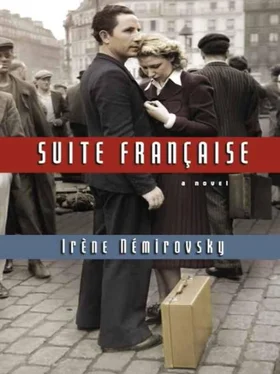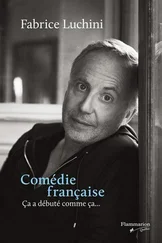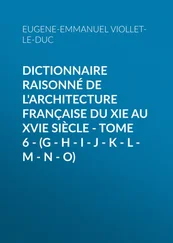What would be good all in all (but is it doable?) is to always show the advance of the German army in the scenes not seen from the perspective of the characters. It would therefore be necessary to begin Storm with an image of people rushing around in France.
Difficult.
I think that what gives War and Peace the expansion Forster[25] talks about, is quite simply the fact that in Tolstoy's mind, War and Peace is only the first volume that was to be followed by The Decembrists, but what he did unconsciously (perhaps, for naturally I really don't know, I'm imagining), in the end what he did consciously or unconsciously is very important to do in a book like Storm etc., even if certain characters are wrapped up, the book itself must give the impression of only being one episode… which is really what is happening in our times, as in all times of course.
[25] "Music, though it does not employ human beings, though it is governed by intricate laws, nevertheless does offer in its final expression a type of beauty which fiction might achieve in its own way. Expansion. That is the idea the novelist must cling to. Not completion. Not rounding off but opening out. When the symphony is over we feel that the notes and tunes composing it have been liberated, they have found in the rhythm of the whole their individual freedom. Cannot the novel be like that? Is not there something of it in War and Peace?" (E. M. Forster, Aspects of the Novel, Penguin, 2000, pp. 149-50).
22 June 1942 . I discovered, a while ago, a technique that has been really useful to me-the indirect method. On absolutely every occasion when I encounter a problem in how to deal with something, this method saves me, gives freshness and strength to the entire story. I use it in Dolce every time Mme Angellier is in a scene. But this method of showing something that I haven't used systematically is open to infinite development.
1 July 1942. Find this for Captivity:
By unifying, always simplifying the book (in its entirety) must result in a struggle between individual destiny and collective destiny. Must not take sides.
My option: England 's style of government by the middle classes, unfortunately impossible, at least wishes to be revived, for in the end its essence is immutable; but it definitely will not happen until after I die: therefore left with two types of socialism. Neither of them appeals to me but there are the facts! [26] One of them rejects me, therefore… the other… But that is out of the question. As a writer, I must state the problem correctly.
[26] These words appear in English in the notebook.
The struggle between the two destinies, this happens each time there is an upheaval, it's not logical; it's instinctive; I think a good part of oneself dies when this happens, but not all of oneself. Salvation, in general, is when the time allocated to us is longer than the time allocated to a crisis. Contrary to what is believed, what is general passes, the whole remains, collective destiny is shorter than the destiny of the simple individual (that's not exactly right. It's a different timescale: we are only interested in the upheavals; the upheavals, either they kill us, or we last longer than them).
To get back to my subject: At first, J. Marie has a thoughtful and detached attitude towards this great number of defeats. Naturally, he would like France to have its revenge but he realises that this is not a goal because whoever speaks of revenge speaks of hatred and vengeance, eternal war, and the Christian is upset by the idea of hell and eternal punishment; he is upset at this idea that there will always be someone stronger and someone weaker; he therefore looks to unification… What he desires, what he yearns for, is harmony and peace. And collaborationism as it is currently practised disgusts him, and on the other hand he sees communism, which suits Benoît but not him. Therefore he tries to live as if the great, urgent, collective question isn't being asked, as if he only has to solve his own personal problems. But then he learns that Lucile has loved and perhaps still loves a German. He immediately takes sides, for the abstraction has suddenly been transformed into hatred. He hates a German and, because of him, through him, he hates or thinks he hates, which is the same thing, a way of thinking. In reality, what happens is that he forgets his own destiny and confuses it with someone else's destiny. For practical purposes, by the end of Captivity, Lucile and J. Marie are in love with each other; this love is sad, unrequited, undeclared, completely conflicted! J. Marie runs away to fight the Germans-if that is still possible by the end of 1942!
The fourth part must be the return, if not the triumph of the chapter when J. Marie appears. Never forget that the public likes having the life of the "wealthy" described to them.
To sum up: struggle between personal destiny and collective destiny. To finish, stress Lucile and Jean-Marie's love and stress eternal life. The German's musical masterpiece. There must also be a reminder of Philippe. Which all in all would correspond to my deepest conviction. What lives on:
1 Our humble day-to-day lives
2 Art
3 God
Maie woods: 11 July 1942. The pine trees all around me. I am sitting on my blue cardigan in the middle of an ocean of leaves, wet and rotting from last night's storm as if I were on a raft, my legs tucked under me! In my bag, I have put Volume II of Anna Karenina, the diary of K. M. and an orange. My friends the bumblebees, delightful insects, seem pleased with themselves and their buzzing is profound and grave. I like low, serious tones on voices and in nature. The shrill "chirp, chirp" of the small birds in the trees grates on me… In a moment or so I will try to find the hidden lake.
Captivity:
1 Corte's reaction.
2 Assassination attempt by Benoît's friends which horrifies Corte.
3 Corte learns something from the talkative Hubert…
4 Through Ariette Corail etc.
5 Her coquettish ways.
6 Denunciation. Hubert and J. Marie are locked up with many others.
7 Hubert, thanks to the actions of his rich and right-thinking family, is released, J. Marie is condemned to death?
8 Here is where Lucile intervenes, the German. J. Marie is pardoned (compact description of the prison here or something of the sort).
9 Benoît helps him escape. Sensational escape.
10 J. Marie's reaction to Germany and the Germans.
11 He and Hubert flee to England.
12 Benoît's death. Brutal and full of hope.
Interspersed in all this must have Lucile's love for Jean-Marie.
The most important and most interesting thing here is the following: the historical, revolutionary facts etc. must be only lightly touched upon, while daily life, the emotional life and especially the comedy it provides must be described in detail.
Correspondence 1936-1945
7 October 1936
Irène Némirovsky to Albin Michel
Thank you for the cheque for 4,000 francs. Regarding this, may I please remind you of my visit to you last spring when I asked if it would be possible for you to work out some arrangement for the future, for you will understand that the situation has become very difficult for me now. You told me then that you would do your very best to comply and that I should put my trust in you. Up until now, you haven't wanted to tell me how you proposed to arrange things, but you promised to make a decision within two months at the latest. You still haven't written anything to me about this since our meeting, which was nearly four months ago. I am therefore asking what you intend to do, for alas you understand the necessities of life for someone who, like me, possesses no great wealth and only lives by my earnings as a writer.
Читать дальше

![Константин Бальмонт - Константин Бальмонт и поэзия французского языка/Konstantin Balmont et la poésie de langue française [билингва ru-fr]](/books/60875/konstantin-balmont-konstantin-balmont-i-poeziya-francuzskogo-yazyka-konstantin-balmont-et-thumb.webp)










